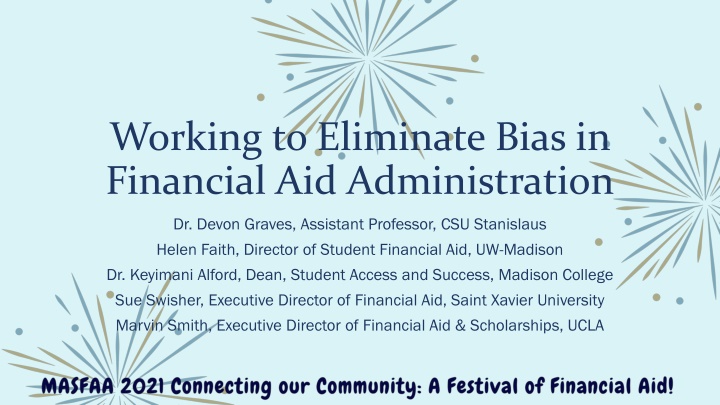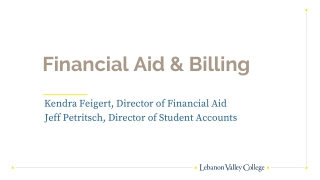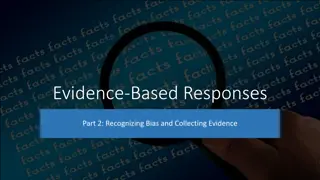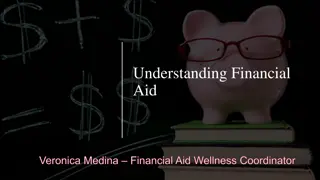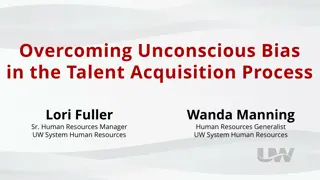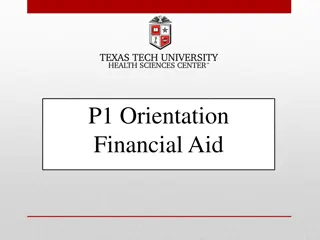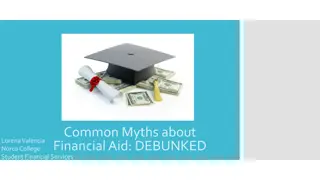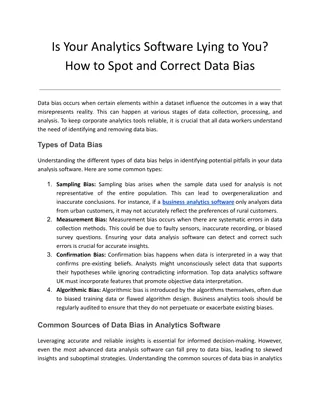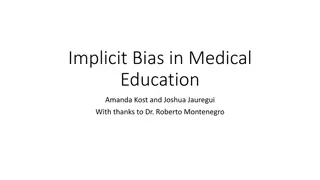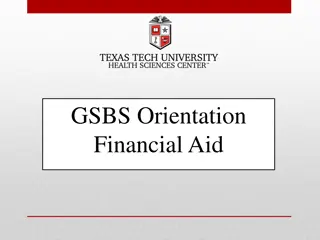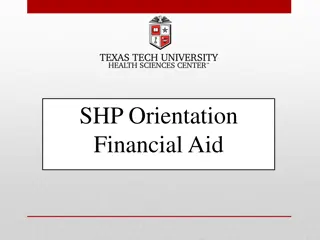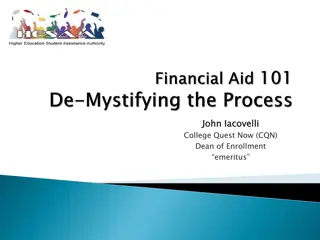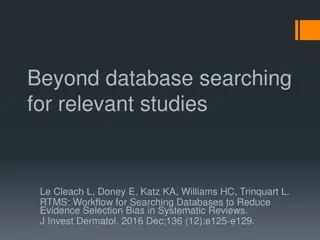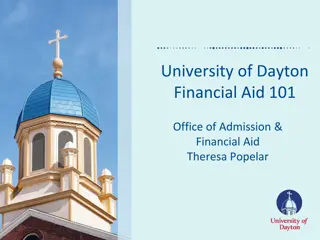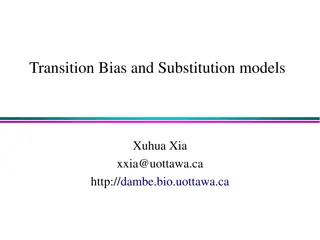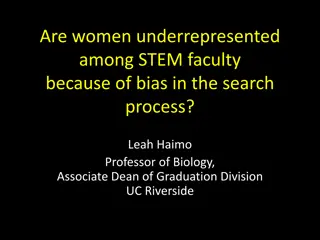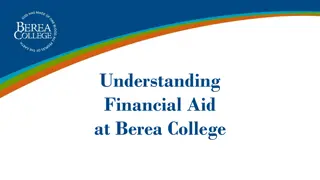Eliminating Bias in Financial Aid: Research Insights & Student Experiences
Addressing bias in financial aid administration is crucial. Understanding the impact of racism on student aid and income verification processes is essential. This session explores research findings and real student perspectives, shedding light on effective strategies to create fairer financial aid systems. Dive into how students experience financial aid verification policies, uncovering challenges faced by community college students. Join experts as they discuss the intersection of racism, financial aid, and student experiences.
Download Presentation

Please find below an Image/Link to download the presentation.
The content on the website is provided AS IS for your information and personal use only. It may not be sold, licensed, or shared on other websites without obtaining consent from the author.If you encounter any issues during the download, it is possible that the publisher has removed the file from their server.
You are allowed to download the files provided on this website for personal or commercial use, subject to the condition that they are used lawfully. All files are the property of their respective owners.
The content on the website is provided AS IS for your information and personal use only. It may not be sold, licensed, or shared on other websites without obtaining consent from the author.
E N D
Presentation Transcript
Working to Eliminate Bias in Financial Aid Administration Dr. Devon Graves, Assistant Professor, CSU Stanislaus Helen Faith, Director of Student Financial Aid, UW-Madison Dr. Keyimani Alford, Dean, Student Access and Success, Madison College Sue Swisher, Executive Director of Financial Aid, Saint Xavier University Marvin Smith, Executive Director of Financial Aid & Scholarships, UCLA
Introductions Dr. Devon Graves Dr. Devon Graves California State University, Stanislaus Helen Faith Helen Faith University of Wisconsin-Madison Dr. Dr. Keyimani Keyimani Alford Madison College Alford Marvin Smith Marvin Smith University of California Los Angeles Sue Swisher Sue Swisher Saint Xavier University
About Todays Session Research Perspective Aid Office Perspective Diversity Toolkit overview Q&A
What the Research Tells Us About Bias in Student Aid
Financial Aid & Racism White and Dache (2019) Racism exists and influences financial aid at both the levels of the individual (students and staff) and the institutional (financial aid policies). Hyploite and Tichavakunda (2019) Find that racism took the form in a racial stereotype and microaggression, added labor in searching for scholarships, and a factor in reinforcing the racial wealth divide.
Financial Aid Income Verification Financial Aid Offices spend an estimated 22% of operating budget on conducting verification (Guzman-Alvarez & Page, 2021) Students selected more likely to be female, Black or first generation and less likely to enroll in higher education the fall immediately following high school graduation (Lee et al., 2021)
Case Study Objective: Gather student perspectives about how they experience the financial aid verification process. Guiding Question: How do community college students experience financial aid verification policies and practices?
Site Community College located in California Approximately 20,000 students in attendance 77% Hispanic; 6% Asian or Pacific Islander; 6% White, 2% Black 5,300 students selected for financial aid verification 64% of students do not complete the FAFSA application Out of the students who complete a FAFSA application, 73% do not complete verification
Verification Selection by Gender Total Verification Gender % % Male 55.3 43.3 Female 43.1 55
Verification Selection by Race/Ethnicity Total Enrollment Verification Race/Ethnicity % % African-American 1.94 0.88 American Indian 0.21 0.2 Asian or Pacific Islander 6.52 4.9 Hispanic 77.35 77.35 87.6 87.6 Multi Ethnicity 0.86 2.9 White 6.61 6.61 1.6 1.6 Unknown 6.51 2
The Student Experience Notification about selection for income verification Initial confusion and lack of support Completing verification requirements Difficulty completing campus internal documents and locating requested support materials. Waiting for financial aid office review of verification forms Lengthy review time delays receipt of aid
Future Research & Practitioner Focus Financial aid professional associations should focus on policy changes at state and federal levels regarding reforming verification process and requirements. Continue to revise and strengthen industry standards about how to engage with students in the financial aid process. Be intentional about studying students of color and other minoritized backgrounds to better understand how they experience the financial aid process.
Confronting and Removing Bias in the Aid Office s Practices
Practitioners View: Helen Faith Priority deadlines exacerbate established inequities Merit metrics used in awarding aid correlate closely with privilege/wealth Complex communication/processes can confuse and discourage students Satisfactory Academic Progress requirements have disproportionate impacts on different groups of students Social Capital and Experience with College Going a Benefit Willingness to push and ask about merit aid, alternatives, ability of parent to borrow, COA options
Practitioners View: Keyimani Alford Assuming that all college students are equal Intentionally know and target your most vulnerable students Knowledge that initial aid offers may be appealed How do families know what to ask? Professional judgment policy decisions can intentionally discriminate against certain populations Unrealistic perceptions of family structure Mother/Father Parent 1/Parent 2 Grandparent/Sister/Aunt/Uncle/Brother/Sister Insight of aid distribution processes, loan counseling steps, repayment navigation
Practitioners View: Marvin Smith Creating a culture of care and grace with staff How are staff hired and trained How are staff members perceived by students and campus partners How are staff recognized and rewarded for empathic counseling efforts How are staff implementing policies and procedures that benefit most at-risk students on campus How do we mitigate staff exhaustion How do we effectively advocate for change
Practitioners View: Sue Swisher Inherent in the aid application Assumption of two-parent nuclear household ignores many student family realities Ignores generational wealth indicators such as home ownership, business ownership, etc. Verification focus on Pell students has unintended disparate impacts on communities of color, often repeated year after year, and may deter or delay enrollment Identity and other issues influence ability to use DRT Federal regulations may appear to students to be biased Verification to low-income students Professional Judgement Communication Ensure inclusive and accessible website Align with school's value and mission statement Student-focused with consistency in message Fair and equitable awarding strategies
Discussion: Finding and Addressing Bias in Our Offices Verification Nuclear family assumptions, etc. Professional Judgment SAP, other completion barriers Communication Scholarship application & selection practices
Verification How aware is your office of issues of bias in verification? What impacts have you observed? What voluntary practices might exacerbate these issues? What steps might your office consider to mitigate bias baked into verification selection and the disproportionate impact on disadvantaged populations?
Nuclear Family Assumptions, etc. Dependency Issues Living with grandparents, relatives, friends and other non-legal guardians Non-custodial parents and spouses who won't support Student estrangement from family Undocumented parents
Professional Judgment (PJ) How do you publicize the types of PJ students can access? EFC, COA, Dependency Overrides, SAP How difficult are your processes to navigate successfully? How do you assess this? What assistance do you or could you provide to mitigate barriers? What challenges does your office face in improving students and families experiences and outcomes?
Satisfactory Academic Progress and Other Completion Barriers How many ways are there to count? SULA*, Pell LEU, SAP, R2T4 so much more risk of failure than reward for trying Loans go into repayment and capitalize during stop out period How does your school deal with balances when a student wants to re-enter?
SAP Impact: Deep Dive The Student Success Through Applied Research (SSTAR) Lab at UW- Madison analyzed SAP data from 2014-2021 Findings: Several factors correlated with increased likelihood of not meeting SAP: Black students, Hispanic students, older students, Asian students, those who identify with two or more racial groups, Wisconsin residents, and Pell recipients Some factors had no significant correlation with SAP: Dependency status, transfer status, first-generation status Have you reviewed your SAP statistics? Have you taken steps to mitigate biases?
SAP Appeals: Compliance and Perception of Risk Nuances of different types of appeals Federal scrutiny of SAP appeal exceptions? Campus scrutiny of allowing struggling students to progress? Office scrutiny of consistent decision-making? Students presented ALL options?
Are we communicating effectively? Easy to access information on your website? In your written materials? Outreach for incomplete files? Forms to help guide applicants? Text/email info? Who works on your communication language? Are students involved?
How Do We Direct Students and Families to Contact Us? Does your department's website include staff direct emails or a general financial aid email? Does your office have required response times of staff members to students, families, staff/faculty colleagues? Do you include suggested formats for student communication? (ex: include student id number, etc.) Does your office have social media handles to communicate with students and campus community? How often are they used and who manages the communication?
Scholarship Selection Processes Research has shown that White students receive a disproportionate share of private scholarships Implicit bias in the scholarship selection process can be connected to students names, test scores as proxy for merit, and co-curricular activities Disproportionate scholarship awards may drive loan debt inequities
Addressing Implicit Bias in Scholarship Selection Lo Moser Klink at UW-Madison developed an intervention for scholarship administrators to learn about implicit bias and apply a holistic review of applications, comprised of three parts: Web pages on inclusive practices for scholarship administrators https://financialaid.wisc.edu/types-of-aid/scholarships/inclusive-practices/ Holistic training modules Annual meeting for all scholarship administrators with a featured topic on implicit bias, discussion of best practices, and review and update of website and training modules Has your campus engaged in addressing implicit bias in scholarship selection?
NASFAAs Implicit Bias Toolkit
Examining Implicit Bias in Financial Aid Policies and Procedure Task Force As individuals, we all have implicit or unconscious biases which are the assumptions, stereotypes, and unintentional beliefs about others based on their perceivable characteristics. The toolkit recognizes the biases and provides recommendations to eliminate them.
Toolkit Topics Awareness and Individual Development Policy Cost of Attendance Policy Scholarship Policy Institutional Forms Policy Professional Judgment School Selected Verification Policy Communication Policy Student Worker Program Policy
Questions? dgraves1@csustan.edu Dr. Devon Graves msmith@fas.ucla.edu Marvin Smith helen.faith@wisc.edu Helen Faith klalford@madisoncollege.edu Dr. Keyimani Alford swisher@sxu.edu Sue Swisher
